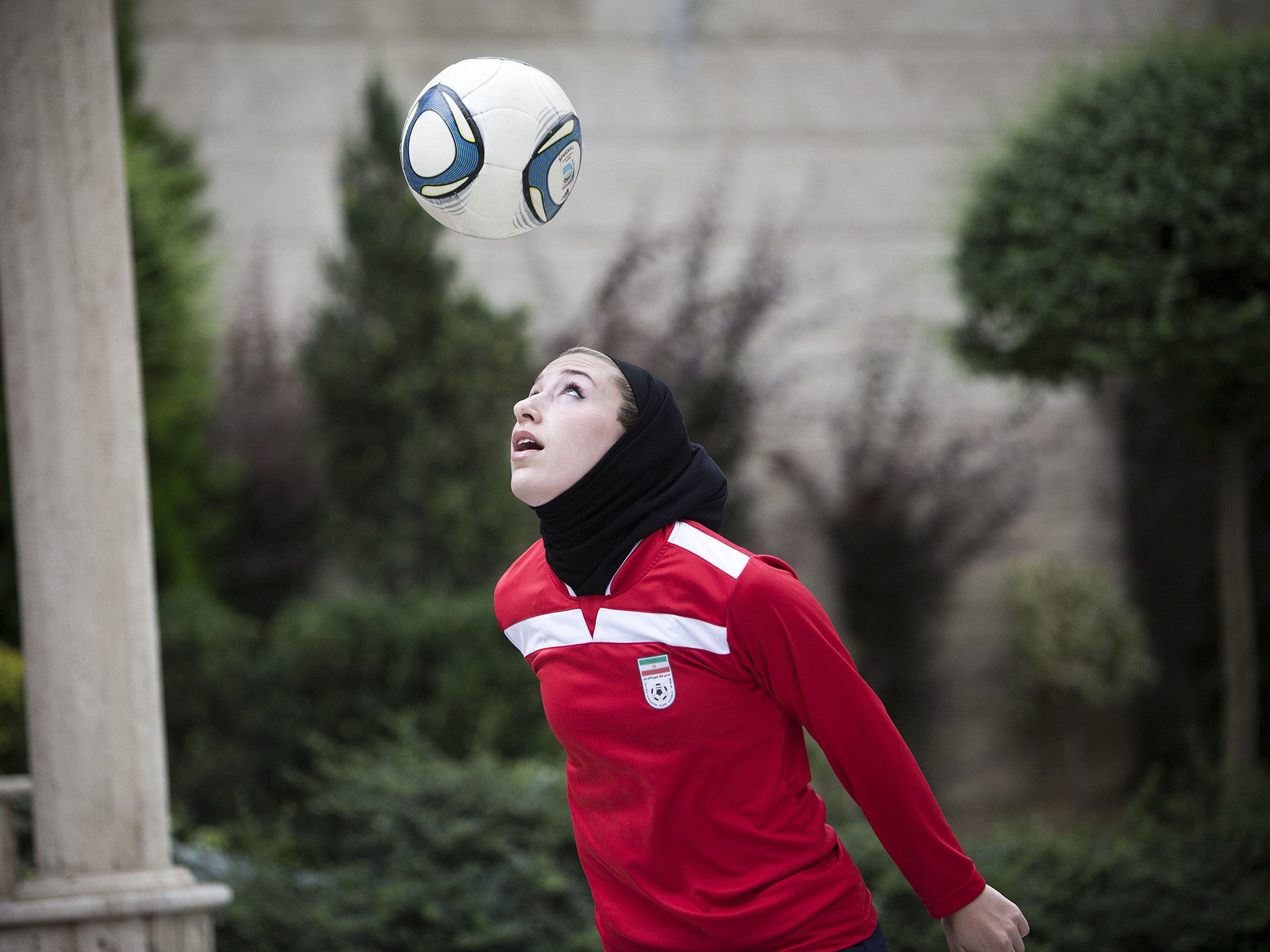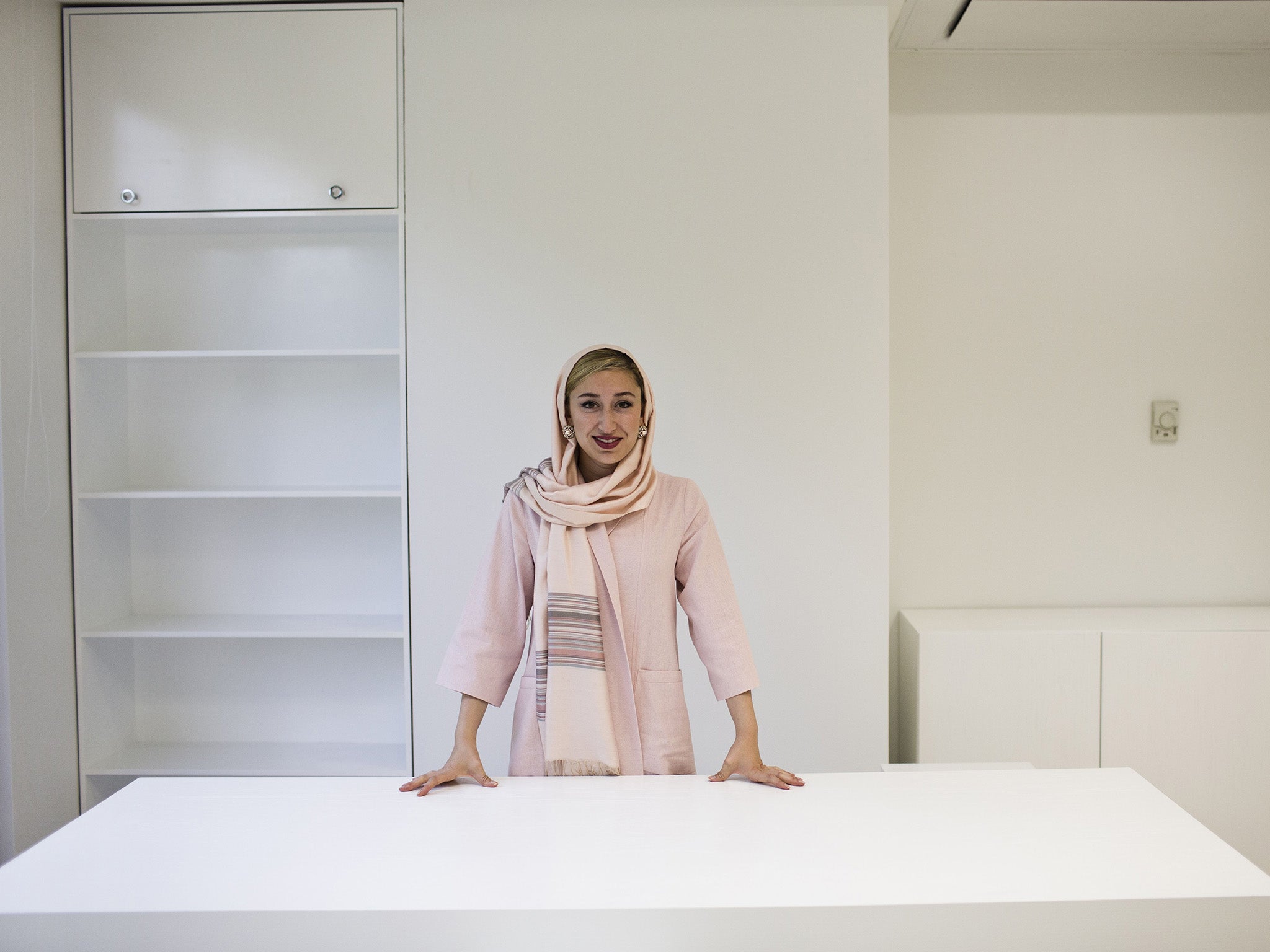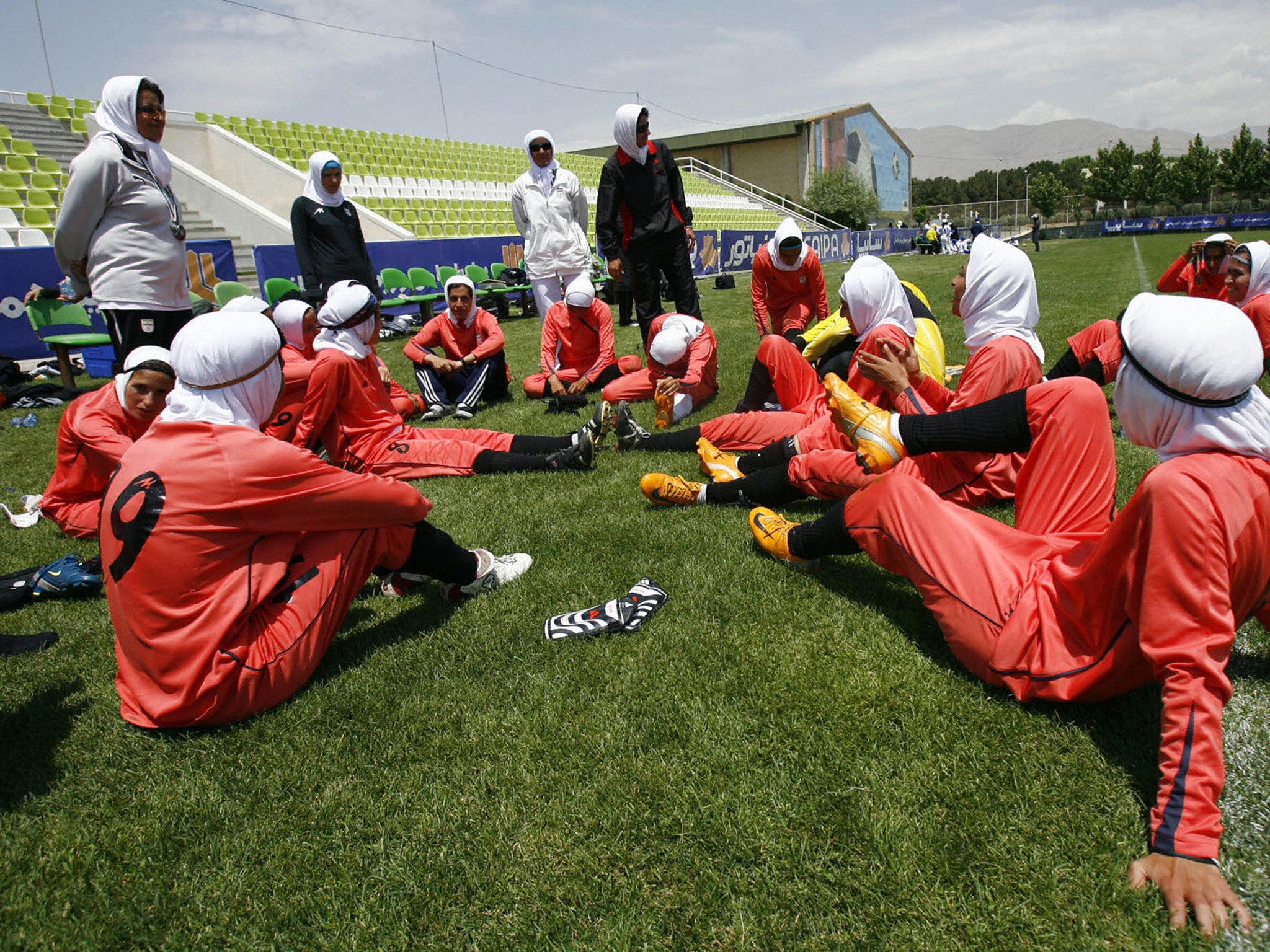Katayoun Khosrowyar: Meet the Iranian-American athlete leading a football revolution
She grew up playing soccer in Oklahoma. Now she’s head coach of Iran’s under-19 national women’s team. Katayoun Khosrowyar speaks to Negar Mortazavi about putting her university scholarship and lifestyle aside for the sake of the beautiful game


Women’s sports have always been a sensitive issue in Iran. Since the 1979 revolution, there have been several bans placed on women’s sports and on female athletes, including the mandatory hijab, which female athletes have to wear even during competitions.
But thanks to the perseverance of women and the help of progressive officials over the years, the restrictions have gradually eased, and women’s sport has started to find its place in the Islamic republic. Various sports teams have emerged, a new generation of female athletes has gained prominence and international championships have been won against all odds. In 2016, 18-year-old Kimia Alizadeh made history by winning a bronze medal at the Rio Olympics, becoming the first Iranian woman in history to do so.
Katayoun Khosrowyar is another trailblazing woman in Iranian sports. The Iranian-American athlete grew up playing football in Oklahoma. But her Iranian roots eventually led her to Tehran, where she is now leading a football revolution as the head coach of the country’s under-19 national women’s team.
She sees herself as an ambassador for two countries that have been enemies since before she was even born. I spoke to her in Tehran.
So, tell us about life growing up Iranian in middle America.
Khosrowyar: I was born in Tulsa, Oklahoma. It’s a small city but has a wonderful community vibe to it and is quite diverse. I went to a really cool private school where we had many religions and ethnicities, and were open and knowledgeable compared to the rest of the midwest.
My father came to the US as a young boy and became very Americanised through his upbringing. By the time he had kids, he didn’t have time to teach us much about Iranian culture. The most that I knew up until 17 was that the food is amazing and the people are vibrant and energetic. Growing up, I did feel a little different but at the same time I was very American. In all the sports I was in the varsity team, I was a highly recognised soccer player and a student athlete. I just thought of myself as an American with an Iranian-Azeri background.
Soccer is not a regualr sport for Iranian girls and still not so much even for American girls. How did you get into it?
My father was a professional swimmer in Iran and when he went to the US he was training all the time for triathlons. My older sister Laila was also a very good swimmer and was one of the girls who was going to go for the junior Olympics. Soccer became very popular in Tulsa in the beginning of 1990s with good coaches coming from Europe and Latin America.
My father put me in and I fell in love with it. And it was a cool, tight group. The parents were always watching us play and we would all go to the pizza place after. And that also helped me develop my skills not just as a player but as a person. Soccer is not a common sport for Iranian girls to play, but they love it a lot, and if they were given the opportunity that I was given, I’m sure they would take advantage of it.
How did you end up in Iran, playing for the national team and later becoming a head coach for the under-19 team yourself? Tell us the story.
I was very Americanised and only knew that I had Iranian-Azeri roots. I didn’t speak Farsi and didn’t even know where Iran was geographically. But I felt such a strong love towards it. At the end of my junior year, I was going to be recruited to play soccer professionally at a university and it was my only chance to come see the family I never met and spend time with my grandparents.
I took two weeks off and came to Iran, but I still had to train because going back to the US I had tournaments coming up. I couldn’t just eat a bunch of kabab and barbary (an Azeri bread). I came to Iran and found a futsal team, the only thing similar to soccer. Obviously my body was a lot stronger than the other girls' so I was tackling and pushing and doing long balls and hard shots, and everyone was shocked.
And you know how the Iranian social ecosystem works; once someone says something it goes around the entire country and everyone finds out. It reached the ear of Shahrzad Mozaffar, who became the first head coach of the women’s national soccer team after the revolution. She told me they are starting the first women’s national soccer team and wanted me to help. Without hesitating I said I would love to be part of Iran’s national team.
That was 2005, one of the best years of my life, to be able to do something so historic. I had 24 hours to weigh all the pros and cons; am I willing to give up my university scholarship and American lifestyle, to come to Iran with a different culture, tradition, mentality, have to wear a hijab while playing, is it worth putting everything aside? My family told me you are going to be amazing for the other girls. And I feel like I was put on this earth to try to impact positively on other women. So I took the opportunity and took advantage of my situation to help and promote the sport in Iran.

How do you feel about living and working in Iran? What challenges do you face?
Iran has definitely kept me on my toes. There are so many opportunities here that I feel like I have to take advantage of. Not to fix anything but to be able to shed some light, that we need to build academies, get communities together, get a lot of OKs from high level officials for this development to go forward.
But to live and work here has been amazing, otherwise I wouldn’t have stayed for so long. The support I get from the federation, the locals, the community and the system, has been amazing. If they didn’t want this type of change, they wouldn’t let me move a finger. I don’t think I would be able to get this support anywhere else in the world. And there are so many things that haven’t even started here, so that gives me the opportunity to start them.
My family told me you are going to be amazing for the other girls. And I feel like I was put on this earth to try to impact positively on other women
As an American and a young woman in the sports industry, how are you manoeuvring your way in Iran? What advantages and disadvantages do you have compared to an Iranian or a man in your position?
Previously when I told people here that I am a soccer player, they would say do you know how to juggle a ball? Can you play for 90 minutes? Do you play on the same grass field? But after 14 years and specially in the past five years, when you say you are a soccer player, they ask are you Esteghlal or Persepolis (the two major clubs in Iran)? How was your last game? Now people know our games, they know our camps. The media has helped a lot too, shed some light on what we are doing as female soccer professionals.
People are very interested in what you are doing as a player and coach. It opens a lot of doors in the community and the country as far as sponsorships. Disadvantages are the paycheck, obviously, and the fact that women here barely get a bonus after a win or championship. Whereas men get a bonus after every single game. This is something that is being more carefully looked at, because they see that women are putting everything aside to become professional soccer players and can’t manage to do two jobs at the same time.
What do you miss about America the most? And what do you love about Iran the most?
I just came back from Houston and one thing I miss about the US is the ease of everything. Everything has its grounded rules and laws, easy and straightforward. In Iran nothing is straightforward. You don’t know who to ask, where to ask, how to ask. The bureaucracy to just get one letter signed is very difficult, for example for inviting a player. The US has its own methods and it’s very easy to have access to those methods.
But I love that Iran is so different that you are constantly going out of your way to find solutions. I am a problem solver and when you hear a lot of “No”, you have to find a way to get that one “Yes”. In the US everything is: “Sure, just give me five minutes and I will sort this out for you.” But here you learn to establish yourself as a strong professional and a strong woman and never take no as an answer.
Women’s sports became very limited after the revolution in Iran but women slowly made a comeback and now are even winning Olympic medals. How do you see the state of women’s sports in Iran today?
Iranian women are definitely taking huge strides in the Olympics, Asian games, and international tournaments. Comparing to our neighbours, like the GCC, we are on the top. The girls are very talented and we have good coaches. Although they look different because of the hijab, I think that gives them a stronger will to perform better and win.
People think that we wouldn’t be able to win anything and we were taken aback by what we have to wear. But this just gives us more to fight for and prove that no matter what you put on us, we are still going to win medals.
I don’t see women stopping any time soon. I see more young girls getting more involved in huge area of sports, ice skating, field hockey, paintball tournaments, surfing, soccer, taekwondo, karate, track and field, and these girls are getting massive support and sponsorships from local companies. They compete with the Islamic veil but they kick butt. They are showing that there is no difference.

Although I must say that if they didn’t wear the hijab they could perform a lot better but with it, we are fighting even harder to stay on top of rankings. It’s a shame that Nike didn’t come after Iranian girls for their hijab campaign because we have won Olympic medals and Asian medals and are very well recognised.
Women have been fighting against the ban to get into stadiums to watch men’s games. And recently a group of women were allowed to get in. Why did it happen and how did it feel for you to be there?
For as long as I’ve been here, women have been fighting to go into the stadium. The majority of people, men and women, want this to happen and are 100 per cent for it. The few decision makers, who are ultra conservative, do not want this to happen. It’s happened twice and we were able to go into the stadium. The first time was a selected few, and the second time a lot of women were able to get tickets to come watch the game. And it’s happening because they see women love football, they love to cheer their teams, and want to be involved in this beautiful game.
It had to be passed through so many bureaucratic levels for women to attend these two times. But the fact that it happened is a huge deal and I’m sure it will happen more. People are slowly changing their minds about why and how women love football. And when they see women try to make achievements in football, the more they will be open to this.
Previously women were not as interested and involved. But now you see women debating about teams and games and players, and the more this circulates, the better it is. I’m sure in the near future this is going to be something from the past.
We know US sanctions against Iran are taking a hit on the economy. We also hear of other areas, like sports, that are affected by sanctions. For example Nike stopped sponsoring Iran’s national soccer team in the last World Cup. Do sanctions affect your work?
I have had a lot of my action plans hindered by sanctions. Over the summer we all heard the story of Nike not giving their shoes to Iranian players, which should have rightfully been given to them. It’s a horrible position to be in. But Iranians are used to this treatment and they just went and bought shoes from the mall next door.
My problems are mainly in trying to get funds to help build academies across the country for the youth to develop talent. Sanctions have also affected my work in trying to bring the Iranian girls to the US for a tournament, or bring American girls to Iran for a tournament, and get better sponsorships and packages for that. Sanctions have definitely hindered the growth. But I am getting a lot of help from domestic people here who want to sponsor women’s football. It’s not as fast as I want, but it’s better than nothing.
Your two countries have been in a political fight for the past four decades. How does that affect you and your work?
I don’t know Iran and the US without a political fight. I don’t know an Iran without sanctions. And I don’t know a US that doesn’t have a negative stigma against Iran. This is one of the reasons I travelled here to see if those negative connotations were true. But believe or not, Iranians love Americans. And when I talk to Americans, they love the pictures that I show of how Iran really is and how the people are here. This gives me a lot of work, because I’m always in the middle of showing my two sides how wonderful each are, to each other.
Telling Iranians all about America, how amazing it is, the schooling system, the shopping, etc, and telling Americans how much fun it is in Iran, the travel, how historic and traditional, how it’s kept to its roots, people are so hospitable, the food is amazing. And I have changed people’s perspectives and minds. I hope the political fight goes away and these two countries do more together than against each other.
Maybe we are not too far away from this wish. I feel like this is a major part of my development as a person, to be a spokesperson for my two countries. Because many Americans haven’t been to Iran and a lot of Iranians haven’t been to America. So it’s a matter of telling them and showing them and talking to them about what it is like to live in either country.
Join our commenting forum
Join thought-provoking conversations, follow other Independent readers and see their replies
21Comments